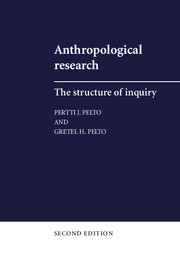Book contents
- Frontmatter
- Contents
- Preface to second edition
- Preface to first edition
- 1 The domain of methodology
- 2 Science and anthropology
- 3 Operationalism in anthropological research
- 4 Units of observation: emic and etic approaches
- 5 Tools of research – I
- 6 Tools of research – II: nonverbal techniques
- 7 Counting and sampling
- 8 Measurement, scales, and statistics
- 9 Art and science in field work
- 10 Research methods, relevance, and applied anthropology
- 11 Building anthropological theory: methods and models
- Appendixes
- Bibliography
- Index
2 - Science and anthropology
Published online by Cambridge University Press: 05 June 2012
- Frontmatter
- Contents
- Preface to second edition
- Preface to first edition
- 1 The domain of methodology
- 2 Science and anthropology
- 3 Operationalism in anthropological research
- 4 Units of observation: emic and etic approaches
- 5 Tools of research – I
- 6 Tools of research – II: nonverbal techniques
- 7 Counting and sampling
- 8 Measurement, scales, and statistics
- 9 Art and science in field work
- 10 Research methods, relevance, and applied anthropology
- 11 Building anthropological theory: methods and models
- Appendixes
- Bibliography
- Index
Summary
When we try to establish a useful definition of science, we immediately encounter the basic problem of all definitions: Different people use the term in quite different ways and contexts, and it is often loaded with a considerable freight of value judgment. We have only to listen to the outpouring of claims in the mass media for “scientifically proved” products to see the term's range of usage and implication. Consider also the problems raised by the following expressions: “Christian Science,” “scientific haircuts given here,” “library science,” and “scientific bridge playing.”
The word science is derived from the Latin word scientia (sciens, the present participle of scire, “to know”), and Webster's Collegiate Dictionary gives a series of definitions for it, including:
1. Knowledge; 2. Any department of systematized knowledge; 3. Art or skill – chiefly humorous or sporting; as, the science of boxing; 4. A branch of study concerned with observation of facts, esp. with the establishment of verifiable general laws. … 5. … accumulated knowledge systematized and formulated with reference to the discovery of general truths or the operation of general laws.
A widely accepted way of defining science is to equate the term with the concept of methodological rigor. For example, after combing a wide range of literature about science, Carlo Lastrucci suggests that there exists something like a “consensus among authoritative writers with regard to the essential attributes or processes of science.
- Type
- Chapter
- Information
- Anthropological ResearchThe Structure of Inquiry, pp. 17 - 37Publisher: Cambridge University PressPrint publication year: 1978

